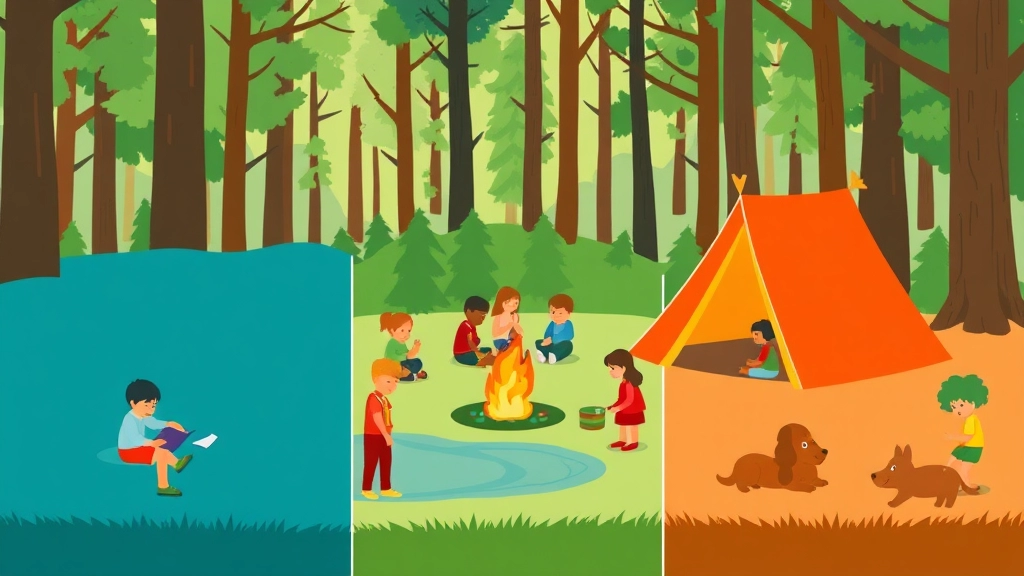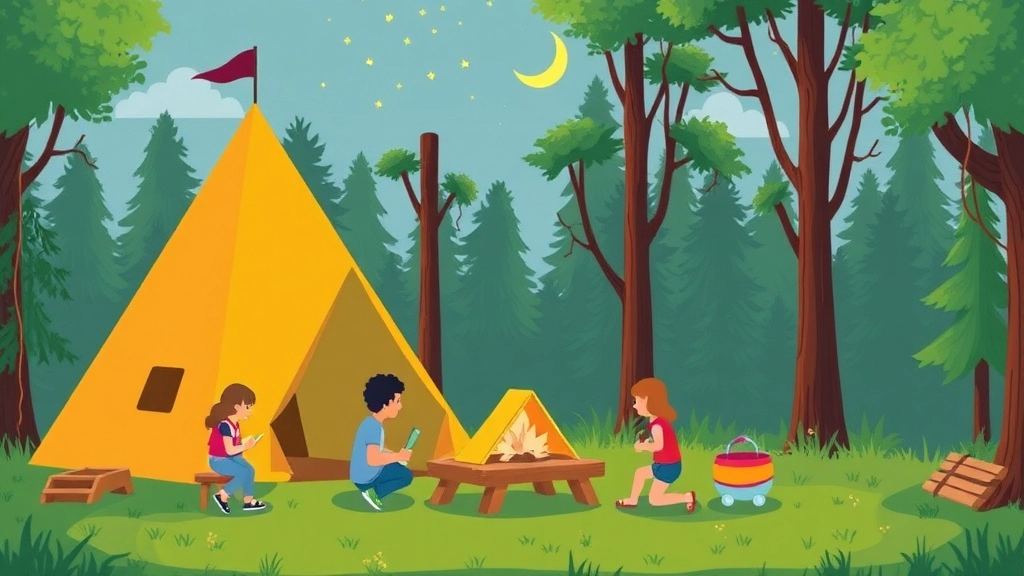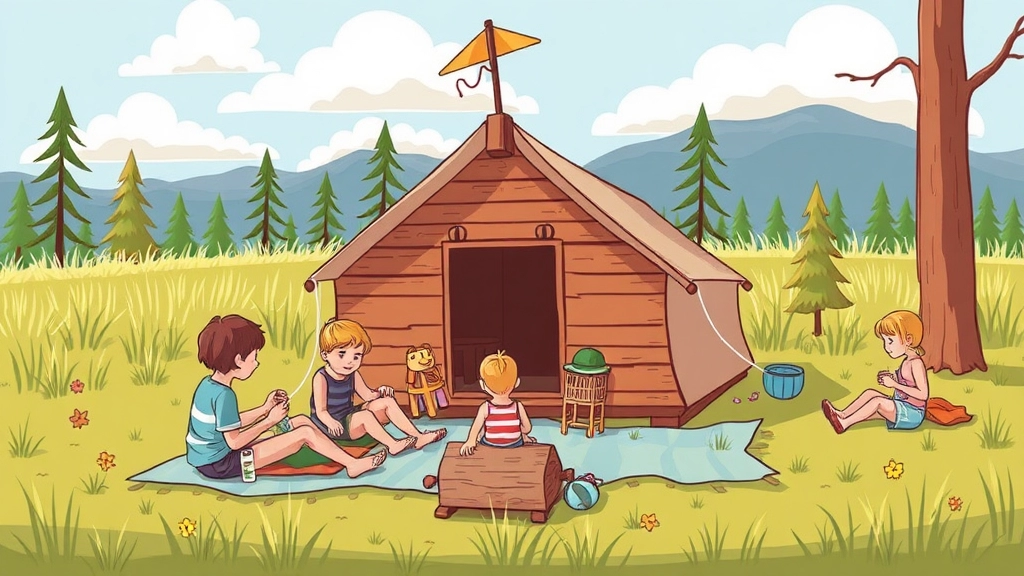Ever thought “summer camp” sounds a bit too generic or old-school? You’re not alone. This article explores another word for summer camp, diving into a variety of alternatives that better capture the unique essence of what different camps offer. From adventure camps to youth retreats, we’ll uncover terms that not only sound more appealing but also fit specific activities and vibes.
We’ll also delve into variations based on camp activities, regional and cultural alternatives, modern adaptations, and niche camps for specific interests. Whether you’re looking for a tech-savvy STEM camp or a serene mindful retreat, this guide will help you find the perfect fit. Ready to give your camp a fresh new identity? Let’s get started!
Alternative Terms for Summer Camp
Ever wondered if there are other ways to refer to a summer camp? I get it, “summer camp” can sound a bit old-school or generic. Let’s dive into some fresh alternatives that might just fit better with what you’re looking for.
Why Look for Alternatives?
You might be thinking, “Why bother with different terms?” Well, here are a few reasons:
- Variety: Sometimes, the term “summer camp” doesn’t capture the unique essence of what you’re offering or looking for.
- Marketing: A catchy or specific name can make your camp stand out.
- Specificity: Different terms can better describe the activities or the vibe of the camp.
Popular Alternatives
Here are some common alternatives to “summer camp” that you might find useful:
- Adventure Camp: Perfect for those action-packed, outdoor-focused getaways.
- Holiday Camp: A term often used in the UK, giving it a more relaxed, vacation-like feel.
- Youth Retreat: Sounds a bit more serene and focused on personal growth.
- Day Camp: Ideal for programs that don’t include overnight stays.
- Sports Camp: If the main focus is on athletic activities, this term nails it.
- Enrichment Program: Great for camps that focus on educational activities and skill-building.
Making It Fit
When choosing an alternative term, think about what makes your camp unique. Is it the activities, the location, or the type of experience you offer? Here’s how to break it down:
- Activities: If your camp is all about rock climbing, call it an Adventure Camp.
- Location: A camp near the beach? How about Coastal Retreat?
- Experience: If it’s more about personal growth, Youth Retreat might be the way to go.
Real-Life Examples
Let me give you a quick example. My friend runs a camp that’s all about coding and robotics. Calling it a “summer camp” didn’t quite capture the techy vibe. So, he rebranded it as a Tech Innovators Camp. Boom! It was an instant hit.
Another buddy of mine has a camp focused on mindfulness and yoga. She went with Mindful Retreat, and it perfectly encapsulated the serene, introspective experience she was offering.
If you’re looking for more inspiration, check out our summer camp activity ideas and our team-building activities guide to make your camp truly unique.
Variations Based on Camp Activities

Ever wondered what kind of summer camp is best for your kids?
Or maybe you’re just curious about the different types out there?
Well, let’s break it down.
Sports Camps
If your kid is all about sports, then sports camps are a no-brainer.
From football to tennis, these camps focus on improving skills and teamwork.
- Skill Development: Coaches help refine techniques.
- Teamwork: Kids learn to work together.
- Fitness: Keeps them active all summer.
Arts and Crafts Camps
Got a budding artist at home?
Arts and crafts camps are perfect for nurturing creativity.
- Creativity: Kids explore different art forms.
- Focus: Helps improve concentration.
- Fun: It’s all about having a blast while creating something unique.
Adventure Camps
If your child loves the great outdoors, adventure camps are the way to go.
Think hiking, rock climbing, and canoeing.
- Confidence: Overcoming challenges builds self-esteem.
- Nature: Kids learn to appreciate the environment.
- Skills: They pick up survival skills and more.
Science Camps
Got a mini Einstein?
Science camps are all about experiments, robotics, and coding.
- Knowledge: Expands their understanding of the world.
- Problem-Solving: Enhances critical thinking skills.
- Fun Learning: Makes education enjoyable.
Performing Arts Camps
If your child loves to be in the spotlight, performing arts camps are ideal.
From acting to dancing, these camps focus on performance skills.
- Confidence: Boosts self-esteem through performance.
- Creativity: Encourages self-expression.
- Teamwork: Kids work together on productions.
Why These Variations Matter
Choosing the right camp isn’t just about keeping your child busy.
It’s about enriching their lives.
It’s about helping them grow.
And it’s about making sure they have a summer they’ll never forget.
So, what’s it going to be?
Sports, arts, adventure, science, or performing arts?
Each has its unique perks.
And each can offer your child something special.
No fluff, just the facts.
Pick the right camp, and watch your child thrive.
Need More Info?
Check out our other articles on summer camp options.
Or drop us a message.
We’re here to help you make the best choice.
Keep it real, keep it engaging, and keep it fun.
That’s what summer camp is all about.
Regional and Cultural Alternatives
Ever wondered what options are out there if traditional summer camps aren’t your thing? Maybe you’re looking for something that fits your regional vibe or cultural background. Trust me, you’re not alone in this quest. Let’s dive into some interesting alternatives that might just be what you and your family are looking for.
Local Flavours: Camps with a Regional Twist
Depending on where you live, summer camps can take on a whole different flavour. For instance, in the UK, you might come across holiday camps that offer a mix of outdoor activities, arts and crafts, and even educational sessions. These camps often take advantage of the local scenery and history, making the experience both fun and enriching.
Examples:
- Scottish Adventure Camps: Think hiking in the Highlands, exploring ancient castles, and learning about Scottish folklore.
- Cornish Surf Camps: Perfect for those who love the ocean, these camps focus on surfing, beach games, and marine biology.
Cultural Camps: Embracing Heritage
For families looking to keep cultural traditions alive, cultural camps offer a fantastic alternative. These camps focus on teaching kids about their heritage through various activities, language lessons, and traditional crafts.
Examples:
- Irish Heritage Camps: Kids can learn Gaelic, participate in traditional Irish dancing, and even hear stories from local folklore.
- Asian Cultural Camps: These might include lessons in calligraphy, martial arts, and cooking traditional dishes.
Urban Camps: The City Experience
Not everyone has easy access to the countryside, and that’s where urban camps come in. These camps take advantage of city resources, offering activities like museum tours, theatre workshops, and science lab experiments.
Examples:
- London Explorer Camps: Kids get to visit landmarks like the Tower of London, participate in West End theatre workshops, and explore the city’s rich history.
- New York City Camps: Think Broadway shows, visits to the Museum of Natural History, and Central Park adventures.
International Camps: A Global Perspective
If you’re up for a bit of travel, international camps can offer an exciting twist. These camps not only provide traditional camp activities but also give children a chance to experience a new culture and make friends from around the world.
Examples:
- European Adventure Camps: These might include activities like skiing in the Alps, exploring ancient ruins in Greece, or sailing in the Mediterranean.
- Asian Exploration Camps: Kids can learn about different cultures through activities like Japanese tea ceremonies, Chinese calligraphy, or Indian yoga sessions.
Why Consider Regional and Cultural Alternatives?
Choosing a camp that aligns with your regional or cultural background can provide a more meaningful experience for your child. It can help them connect with their heritage, learn new skills, and build a sense of community.
Key Benefits:
- Cultural Enrichment: Kids learn about their own heritage or explore new cultures.
- Local Adventures: Utilises local resources and scenery, making the experience more relatable.
- Community Building: Helps children connect with others who share similar backgrounds or interests.
Modern Adaptations of Summer Camps

Ever wondered if summer camps are still relevant in today’s digital age?
You’re not alone.
Modern summer camps have evolved, and trust me, they’re nothing like the ones you remember from your childhood.
Why Bother with Modern Summer Camps?
Kids today are glued to screens.
Parents are worried about their kids missing out on real-world experiences.
Modern summer camps offer a solution.
They blend traditional outdoor fun with tech-savvy activities.
What’s New in Modern Camps?
Here’s the lowdown:
- STEM Camps: Think coding, robotics, and science experiments. Kids are not just playing; they’re learning skills that will set them up for the future.
- Eco-Friendly Camps: With a focus on sustainability, these camps teach kids about the environment. They might even come home and teach you a thing or two about recycling!
- Virtual Camps: Yes, you read that right. Virtual camps are a thing now. Perfect for kids who can’t travel or prefer staying close to home. They offer interactive activities and online socialising.
- Special Needs Camps: Tailored for kids with specific requirements, ensuring everyone gets a chance to enjoy and learn.
Real Stories, Real Impact
Take my mate Tim, for example.
He sent his son to a STEM camp last summer.
The kid came back buzzing with excitement about coding and even built his own mini robot.
Tim was over the moon, seeing his son passionate about something other than video games.
The Benefits You Can’t Ignore
- Skill Development: From coding to cooking, kids pick up new skills.
- Social Interaction: They meet new friends and learn to work in teams.
- Independence: Being away from home teaches them self-reliance.
- Physical Activity: Keeps them active and away from screens.
How to Choose the Right Camp?
Here are some tips:
- Identify Interests: What excites your child? Science, sports, arts?
- Check Reviews: Look for feedback from other parents.
- Visit the Camp: If possible, take a tour.
- Ask Questions: Don’t hesitate to ask about safety measures, staff qualifications, and daily schedules.
Modern summer camps are here to stay, and they’re better than ever.
Ready to give it a shot?
Niche Camps for Specific Interests
Ever felt like traditional summer camps just aren’t your thing?
You’re not alone.
These days, niche camps are popping up everywhere, catering to all sorts of specific interests.
From coding to cooking, there’s a camp for everyone.
Why Choose a Niche Camp?
- Personal Growth: Develop a unique skill or hobby.
- Like-Minded Peers: Meet others who share your passion.
- Focused Learning: Get in-depth knowledge on a specific topic.
Types of Niche Camps
- Tech Camps:
- Coding
- Robotics
- Game design
- Arts Camps:
- Painting
- Theatre
- Music
- Sports Camps:
- Football
- Tennis
- Extreme sports
- Adventure Camps:
- Hiking
- Survival skills
- Rock climbing
Real Stories, Real Impact
I remember chatting with a friend who sent her kid to a coding camp.
He came back with a passion for programming and even built his own app.
Imagine the confidence boost!
How to Choose the Right Niche Camp
- Identify Interests: What excites you or your child?
- Research Options: Look for camps with good reviews and experienced instructors.
- Consider Logistics: Location, duration, and cost.
For more ideas on how to find the perfect camp, check out our guide to summer camp activities by age. And if you’re interested in tech camps, don’t miss our top STEM summer camps for kids!
FAQs About Modern Summer Camps
What are the different types of summer camps available today?
There are various types of summer camps tailored to different interests, including sports camps, arts and crafts camps, adventure camps, science camps, and performing arts camps. Each camp focuses on specific activities and skills, ensuring that there is something for every child.
How have summer camps evolved in the modern age?
Modern summer camps have adapted to today’s digital age by incorporating tech-savvy activities alongside traditional outdoor fun. Examples include STEM camps, eco-friendly camps, virtual camps, and special needs camps.
Why should I consider a modern summer camp for my child?
Modern summer camps offer a blend of educational and recreational activities that help in skill development, social interaction, independence, and physical activity. They provide a balanced experience that keeps kids engaged and active.
What are STEM camps?
STEM camps focus on science, technology, engineering, and mathematics. Activities might include coding, robotics, and science experiments, helping kids develop skills that are valuable for their future.
What are eco-friendly camps?
Eco-friendly camps emphasize sustainability and environmental education. Kids learn about recycling, conservation, and other eco-friendly practices, often bringing these valuable lessons back home.
What are virtual camps?
Virtual camps offer interactive activities and socializing opportunities online. They are ideal for kids who can’t travel or prefer staying close to home, providing a camp experience without the need for physical presence.
How do I choose the right summer camp for my child?
To choose the right camp, consider the following tips:
- Identify Interests: Determine what excites your child, whether it’s science, sports, or arts.
- Check Reviews: Look for feedback from other parents to gauge the camp’s quality.
- Visit the Camp: If possible, take a tour to get a firsthand look.
- Ask Questions: Inquire about safety measures, staff qualifications, and daily schedules.
What benefits do summer camps offer?
Summer camps offer numerous benefits, including:
- Skill Development: Kids learn new skills, from coding to cooking.
- Social Interaction: They make new friends and learn teamwork.
- Independence: Being away from home teaches self-reliance.
- Physical Activity: Keeps them active and reduces screen time.
Are there camps for children with special needs?
Yes, special needs camps are designed to cater to children with specific requirements, ensuring that every child has the opportunity to enjoy and learn in a supportive environment.
Where can I find more information about summer camp options?
You can check out additional articles on summer camp options or contact camp organizers directly for more details. We’re here to help you make the best choice for your child.
References
-
Different Types of Summer Camps for Kids
-
Types of Summer Camps and How to Choose the Best One
-
Summer Camp Activities Guide

